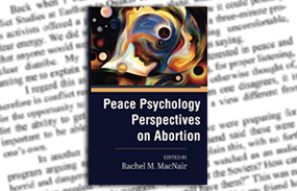
For the first time in its history, the Guttmacher Institute has published a paper acknowledging negative psychological consequences of induced abortion. Authors Kimport, Foster, and Weitz (2011) report on the experiences of 21 women who experienced “emotional difficulties related to an abortion.” Most (14) of the women interviewed were recruited from two secular abortion talklines. The rest (7) were recruited from a pilot study which also focused on women’s experience of elective abortion. Time involved in the interviews ranged from ½ hour to 3 hours with an average of 75 minutes. Using semi-structured interviews, Kimport et al. sought to identify salient themes among participants. More specifically, they attempted to explore the women’s “interactions with others and the broader social context,” (p. 104). This broader context included both the involvement of others in the abortion decision making process and the reactions of others to the pregnancy and abortion. Such “others” included family, friends and partners.
Authors reported that a majority of women, (18 of the 21 interviewed), were experiencing emotional difficulty related to their abortions. Examples of “emotional difficulty” included such things as crying, insomnia, panic attacks, anxiety, sadness, and regret. Two issues were identified that seemed to make the abortion experience particularly difficult. These issues were 1) the decision-making process prior to the abortion and 2) social support or the lack thereof after the abortion.
Kimport et al. state that “Overall, women in our sample expressed a need to control their decision making regarding abortion. When they felt that the decision to have an abortion was not primarily their own or was made under duress, they reported emotional difficulties. Furthermore, women wanted their partner, family and close friends to validate and support their decision making. Fear of an unsupportive reaction by friends and family prompted many respondents to hide their abortions, which often had negative emotional consequences,” (p. 108). In addition, Kimport et al. suggest that “women who acknowledge that their decision is influenced primarily by others, even as they recognize their own desire for an abortion, may need to be referred for additional support afterward,” p. 108.
However, it would seem more logical to offer support upfront, prior to abortion and during the decision-making process. Providing adequate pre-abortion counseling to enhance informed consent and improved screening of women to determine whether or not coercion prior to abortion may serve to prevent the emotional difficulties reported in this study. Considering the gravity and permanence of whatever option a woman chooses to resolve an unplanned pregnancy, adequate time should be allowed for her to fully explore all options.
According to a cross-cultural study by Rue, Coleman, Rue & Reardon (2004) which examined Russian and American women electing an abortion, only 29.4% of women stated they had received counseling before their abortion, 51.9% felt they needed more time to make their decision, 17.5% were counseled on alternatives, 64% felt pressured by others to abort, 30.5% experienced health complications post-abortion, and only 10.8 received adequate counseling beforehand. Finally, after running multiple regression analyses, the researchers found receiving no counseling before the abortion significantly predicted PTSD Arousal subscale scores in American women.
The need for improvements in the provision of quality counseling services prior to an abortion and its aftermath ought not be considered extraordinary or controversial, but rather as affirming the importance of attending to the psychological needs of a woman who is seeking help with an unintended pregnancy. Rather than relying upon the community standard model that looks to the counseling offered by other abortion providers as a guide, a more effective and widely adopted legal standard for pertinent medical disclosures is the reasonable patient standard. The reasonable patient standard affirms patient autonomy rights by providing all of the information a woman needs in order to be an informed participant in an abortion decision. Such a paradigm shift in women’s health care is long overdue.
Kimport et al.’s observation concerning the association between emotional difficulties and women’s perceived lack of support has important implications for those who counsel women post abortion. Obviously, non-judgmental, empathic counseling is required to be effective with women after abortion just as it is effective with clients in general. Moreover, the relationship between emotional difficulty and the issue of shame and stigma needs to be addressed.
As reported by Major and Gramzow (1999), women who felt stigmatized, were less inclined to disclose their abortions. This secrecy led to suppression of thoughts concerning abortion and suppression was, in turn, associated with intrusive thoughts about the abortion. Furthermore, both suppression and intrusion were positively related to psychological distress. This suggests that women may be inclined toward concealment and therefore choose not to seek needed support. In order to meet women’s needs more effectively, post as well as pre abortion counseling may be critical. If both pre and post abortion counseling were routinely practiced when caring for women facing unplanned pregnancy, women would have more opportunities to share their experience and thus receive the help they need.
Diverse counseling perspectives should be available to women so that care is individualized, appropriate, and effective depending on the woman’s age, cultural context, religious beliefs, and unique life circumstances. If both pre and post abortion counseling became a standard component of comprehensive reproductive health care, women would perceive such counseling as normative and, as a result, be more inclined to take advantage of counseling services and thus more likely to find emotional support.
References
Kimport, K., Foster, K., & Weitz, T.A. (2011). Social sources of women’s emotional difficulty after Abortion: Lessons from women’s abortion narratives. Perspectives on Sexual and Reproductive Health, 43 (2), 103-109.
Major, B. & Gramzow, R. H. (1999). Abortion as stigma: Cognitive and emotional implications of concealment. Journal of Personality and Social Psychology, 77 (4), 735-745.
Rue, V., Coleman, P., Rue, J. & Reardon, D. (2004). Induced abortion and traumatic stress: A preliminary comparison of American and Russian women. Medical Science Monitor 10(10): SR5-16.



.jpg)
.jpg)